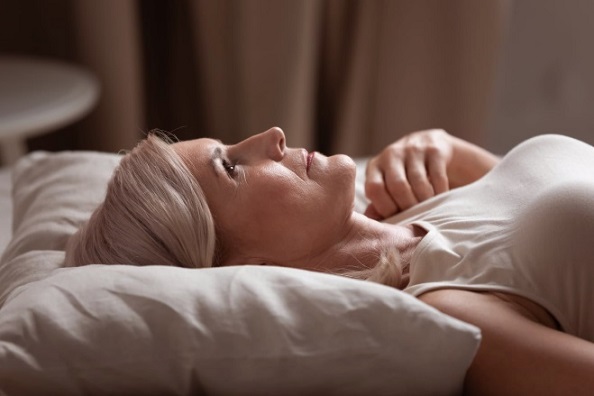Nikhil Prasad Fact checked by:Thailand Medical News Team Feb 24, 2025 1 month, 3 weeks, 1 day, 16 hours, 15 minutes ago
Medical News: Perimenopause is a natural transition in a woman’s life that occurs before menopause, often bringing with it a variety of symptoms that affect overall health. Among these, sleep disturbances are some of the most common and distressing. A new review conducted by researchers from the Department of Gynaecology and Obstetrics at University Hospital Maggiore della Carità and the Department of Translational Medicine at the University of Eastern Piedmont in Italy provides a comprehensive look into the mechanisms behind sleep disturbances in perimenopausal women and explores potential treatment options.
 What Happens to Sleep During Perimenopause
What Happens to Sleep During Perimenopause
Perimenopause is characterized by fluctuations in reproductive hormones such as estrogen and progesterone. These hormonal changes can significantly impact sleep quality and are linked to an increase in insomnia, sleep apnea, and restless leg syndrome. This
Medical News report highlights that sleep disorders affect anywhere between 16% and 47% of perimenopausal women, and this percentage increases further after menopause, reaching up to 60%.
The key contributors to sleep disturbances include hormonal imbalances, night sweats, mood disorders, and physiological changes associated with aging. Declining estrogen levels can lead to increased nighttime awakenings, while decreased progesterone levels affect the ability to maintain deep sleep. Additionally, the body’s internal clock, or circadian rhythm, undergoes changes, leading to irregular sleep-wake cycles.
The Connection Between Vasomotor Symptoms and Sleep Disruptions
Hot flashes and night sweats, known as vasomotor symptoms, are a major reason many perimenopausal women struggle with sleep. These sudden surges of heat cause frequent awakenings, preventing restful sleep. The review explains that estrogen helps regulate the body's temperature control mechanisms, and when estrogen levels drop, the body becomes more sensitive to even slight temperature changes, leading to increased sweating and discomfort during sleep.
The Role of Mood Disorders and Sleep
Another significant factor influencing sleep during perimenopause is the increased likelihood of mood disorders. Many women experience heightened levels of anxiety, depression, and stress, all of which contribute to difficulty falling and staying asleep. The researchers found that poor sleep quality in perimenopausal women is strongly linked to mental health conditions, further emphasizing the need for holistic approaches to treatment.
Sleep Apnea and Other Breathing Disorders
The review also highlights the increased prevalence of sleep apnea among perimenopausal women. This condition, characterized by pauses in breathing during sleep, is often underdiagnosed in women because symptoms can present differently than in men. While men typically report loud snoring, women may experience fatigue, morning headaches, and mood disturbances, making it difficult to identify the condition.
Treatment Options for Better Sleep
Given the complexity of sleep disturbances during
perimenopause, treatment strategies need to be personalized. The review categorizes treatment approaches into non-pharmacological, hormonal, and non-hormonal interventions.
-Non-Pharmacological Treatments
Lifestyle modifications and cognitive behavioral therapy for insomnia (CBT-I) have proven to be highly effective for many women. Strategies such as maintaining a consistent sleep schedule, practicing relaxation techniques, and reducing caffeine intake before bedtime can significantly improve sleep quality. Light therapy and regular exercise also help regulate circadian rhythms and enhance overall well-being.
-Hormonal Therapy
Hormone replacement therapy (HRT) has been found to alleviate sleep disturbances by stabilizing estrogen and progesterone levels. Studies have shown that women who undergo HRT report fewer nighttime awakenings, improved sleep quality, and reduced frequency of hot flashes. However, the review stresses that HRT should be used cautiously, considering individual risk factors and medical history.
-Non-Hormonal Medications
For women who cannot or do not wish to use hormonal treatments, alternative medications such as melatonin supplements, gabapentin, and selective serotonin reuptake inhibitors (SSRIs) offer relief. Melatonin, in particular, has been found to restore sleep-wake cycles and enhance sleep quality without significant side effects. Additionally, newer medications such as dual orexin receptor antagonists (DORAs) show promise in improving sleep duration and reducing nighttime awakenings.
The Importance of Addressing Sleep Issues Early
The researchers emphasize the need for early intervention in managing sleep disturbances during perimenopause. Left untreated, chronic sleep problems can lead to an increased risk of cardiovascular disease, obesity, diabetes, and mental health disorders. Identifying the root cause of sleep issues and tailoring treatment plans accordingly is crucial for improving overall health and quality of life for perimenopausal women.
Conclusion
Sleep disturbances during perimenopause are a widespread but often overlooked problem that can have profound effects on a woman’s health and well-being. While hormonal changes play a key role, factors such as mood disorders, vasomotor symptoms, and sleep apnea further complicate the issue. Addressing these disturbances requires a personalized and multifaceted approach, combining lifestyle modifications, cognitive behavioral therapy, hormonal therapy, or non-hormonal treatments as needed. Health professionals should prioritize sleep assessments for perimenopausal women and develop targeted strategies to improve their sleep quality.
The study findings were published in the peer-reviewed Journal of Clinical Medicine.
https://www.mdpi.com/2077-0383/14/5/1479
For the latest on Menopause, keep on logging to Thailand
Medical News.
Read Also:
https://www.thailandmedical.news/news/menopause-news-american-study-finds-that-low-fat-vegan-diet-with-soy-decreases-hot-flashes-by-95-percent
https://www.thailandmedical.news/news/fezolinetant,-new-drug-for-hot-flash-treatment-for-women-with-menopause
https://www.thailandmedical.news/news/herbal-insights-for-fighting-postmenopausal-osteoporosis
https://www.thailandmedical.news/articles/menopause
https://www.thailandmedical.news/pages/thailand_doctors_listings
